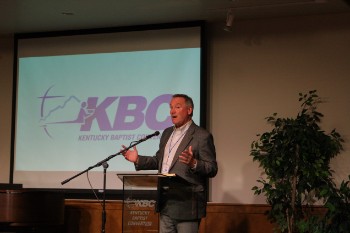
53 — Severns Valley pastor Bill Langley, president of the Kentucky Baptist Convention, opens the Mission Board meeting exhorts Kentucky Baptists, “Let’s come together and build,” in a devotion on leadership based om the Prophet Nehemiah.
LOUISVILLE—Raising the bar by $500,000, the Kentucky Baptist Mission Board members gave a nod May 9 on a $22 million proposed budget for the 2017-18 fiscal year through the Cooperative Program to support missions in their home state, across North America and around the world.
“Kentucky Baptists are committed to getting the gospel to the nations, and it shows in their support for the Cooperative Program,” Paul Chitwood, executive director of the Kentucky Baptist Convention told the Mission Board. “By giving through the Cooperative Program, our churches are funding the greatest evangelistic initiative of our time. It’s inspiring and humbling to see their commitment.”
Lowell Ashby, the KBC’s finance and business services team leader, anticipates that with strong contributions over the next four months, Kentucky Baptists could push Cooperative Program contributions beyond the $21.5 million goal for this fiscal year.
“Basically, we have been tracking the same all year—slightly short of last year, but right on budget, and still expecting to exceed $21.5 million,” Ashby said, adding that he hopes the amount will approach $22 million.
Kentucky churches reached a historic milestone last year in their Cooperative Program support by giving almost $22.3 million for national and international missions and contributing more in a single year than ever before. Kentucky Baptists sent more than $10.6 million through the Cooperative Program and special offerings to the International Mission Board and an additional $4.7 million to the North American Mission Board.
If the 2017-18 budget is met, $10.23 million will be forward to SBC causes, a boost of $232,500 over this year’s goal. The KBC will retain $11.77 million, an increase of $267,500, for state missions and ministries, which includes 7 percent for expenses it shares with the SBC.
Roughly 70 percent of the KBC’s total will fund the Mission Board’s work, with the bulk to be distributed between its church consulting and revitalization efforts—19.7 percent, or approximately $2.32 million—and its evangelism and church planting efforts—17.3 percent, or approximately $2.03 million. The KBC’s mission mobilization efforts will receive about 6 percent, or approximately $710,000.
The other 30 percent will be distributed among the KBC’s nine partnering institutions agencies and WMU auxiliary, with more than half—17 percent, or approximately $2 million—being allotted to Christian education at Oneida Baptist Institute, Clear Creek Baptist Bible College, and the University of the Cumberlands.
In his report to the Mission Board, Chitwood said the Kentucky Baptist Convention is much stronger five years after its reorganization that put a greater focus on strengthening churches, planting congregations, evangelizing the unchurched, and shifting more funding to international missions.
Chitwood said he could not be more pleased with the measurable results of the reorganization, which brought sweeping changes to its structure, staffing and mission. “I believe we can substantiate the claim that the cooperative spirit among our churches and associations has been strengthened,” he said.
“At the outset, let me state that any successes we have witnessed have come by the grace of God, the sacrificial giving and going of our Lord’s churches under the leadership of their pastors, and the hard work of our staff, and in that order,” Chitwood continued. “This is the Lord’s work and the work of our churches long before it is the work of the KBC.”
Noting the decline in the percentage of undesignated receipts from churches being given through the Cooperative Program, from 11 percent to 6 percent over the past two decades, Chitwood said that reality had combined with a growing conviction among church leaders that an answer to the financial struggles of the International Mission Board might be moving more of the KBC’s CP funds to the SBC budget. That impetus led to the development of a new model for state convention work, which some have since dubbed “KBC 2.0.”
“The cornerstone of KBC 2.0 is a new mission statement that focuses all KBC work back to the local church: ‘created by churches, for churches, to help churches reach Kentucky and the world for Christ,’” he said. Staff members have shifted their ministry model away from an event-planning emphasis to a field-driven emphasis, spending less time in the office and more time with pastors, church leaders and associational leaders.
Since the shift, Chitwood said that cooperative missions giving has stabilized for now, two years of increases in baptisms were witnessed, more churches are being planted, and the number of Kentucky Baptists involved in volunteer mission work has grown.
Highlighting how University of Cumberlands is “flourishing beyond what anyone thought imaginable,” he noted that the Williamsburg school has reached an annual budget of $80 million and its total enrollment soon will surpass 8,000 students.
Chitwood also spotlighted the transformation at Sunrise Children’s Services, where the number of kids being served has topped 1,200, calling it “nothing short of a miracle.”
“We are seeing more Kentucky Baptists and more KBC pastors being trained as foster parents, working toward adoptions, and advocating for abused and neglected kids,” Chitwood said.
In other action, the Mission Board approved a realignment of Kentucky Today’s staff, eliminating an associate position to add a managing editor for the convention’s new online news site. (WR)